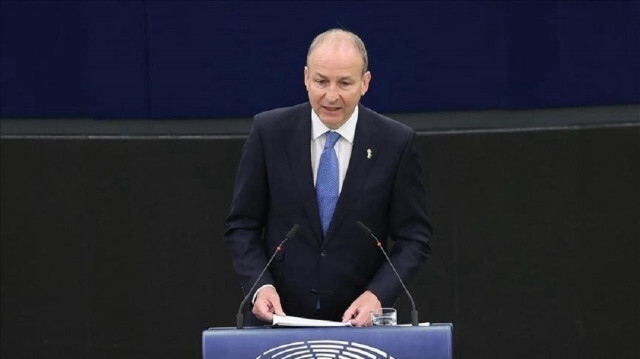
Israel's attacks on UN peacekeepers in Lebanon aim to 'drive the eyes and ears out of South Lebanon,' says Foreign Minister Martin ahead of EU's Foreign Affairs Council meeting in Luxembourg
Israel is “undermining” the UN and its peacekeeping force in Lebanon to give itself free rein, Ireland's foreign minister said on Monday, ahead of the EU's Foreign Affairs Council meeting in Luxembourg.
Israel's attacks on UN peacekeepers in Lebanon aim to "drive the eyes and ears out of South Lebanon and to give itself free rein," Micheal Martin told reporters at the doorstep of the meeting.
“Israel is essentially now undermining the United Nations and the United Nations peacekeeping force with the very rules-based international order,” the minister said, calling on the bloc to adopt a clear stance on the “primacy of the international rules-based order.”
Martin recalled that he previously called for an EU or international teams, as well as international media outlets to be allowed in Gaza, “since the world has really no full picture of what is happening in Gaza.”
The “death and destruction of innocent people” in northern Gaza is “not acceptable or morally tolerable anymore,” Martin warned.
He also called on EU member states to stand “on the side of what is right and proper, and moral in terms of humanity.”
French Foreign Minister Jean-Noel Barrot, for his part, renewed his call for diplomatic solutions to the Middle East conflict rather than the use of force.
He told reporters that France remains committed to Israel's security.
“We consider today that Israel's security cannot be guaranteed by the use of force only. The use of force must yield to dialogue and negotiations. That is why, as many countries, we call for a cease-fire in Gaza as in Lebanon,” the French minister said.
In this context, he stressed that calling for a cease-fire while also arming the belligerents has no coherence.
Israel attacked the United Nations Interim Force in Lebanon (UNIFIL) mission last week and drew criticism from the Western community.
UNIFIL was established in March 1978 to confirm Israel's withdrawal from Lebanon and assist the Lebanese government in restoring authority in the area. Its mandate has been expanded over the years, particularly after the 2006 Israeli war, to monitor cease-fires and facilitate humanitarian aid.
Israel has mounted massive airstrikes across Lebanon against what it claims are Hezbollah targets since Sept. 23, killing at least 1,437 people, injuring over 4,123 others, and displacing more than 1.34 million people.
The aerial campaign is an escalation from a year of cross-border warfare between Israel and Hezbollah since the start of its offensive on the Gaza Strip, in which Israel has killed more than 42,200 people, most of them women and children, since a Hamas attack last year.
Despite international warnings that the Mideast was on the brink of a regional war amid Israel's relentless attacks on Gaza and Lebanon, it expanded the conflict on Oct. 1 by launching a ground incursion into southern Lebanon.

